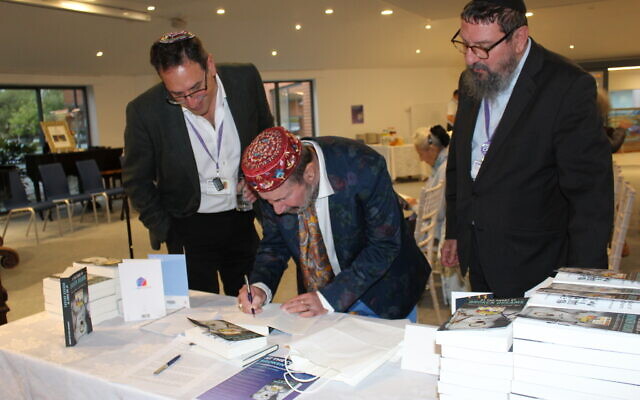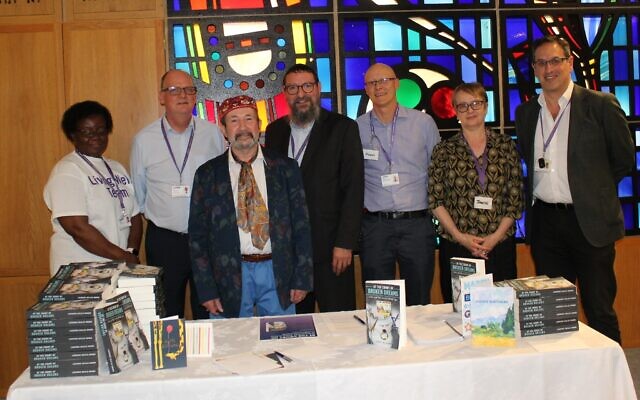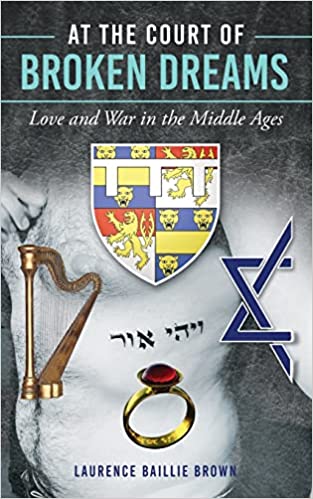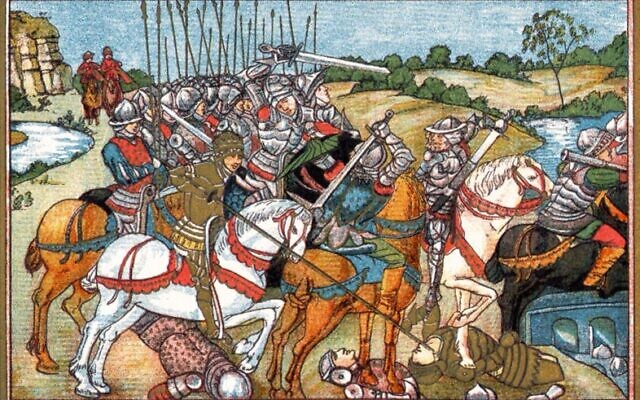A new historical novel with a very unusual author
Brothers, lovers and drama - The Middle Ages prove to be far more exciting than you may think
Dynastic power struggles, deadly betrayals and the brutality of war might be par for the course in Game of Thrones, but the reality of medieval times was far more intense and dramatic – albeit without the dragons – says the author of an intriguing historical novel.
At The Court of Broken Dreams has been penned by Laurence Baillie Brown, a resident of Stella and Harry Freedman House in Friern Barnet.
The 68-year-old has been “enthusiastically” embarking on a second career as a writer, having spent 37 years as a college lecturer teaching business law to his students, before a spell of ill health meant he had to move into the Jewish Care home three years ago.
Laurence recalls “not eating or reading, let alone writing” when he first arrived, but with the encouragement and support of his carers he was able to pick up his pen once more, having published his first novel, Addictions, in 2000.
That time around, Laurence composed a ‘coming out’ story, which he reveals was “based largely on my own life – being brought up Jewish in the north of England and discovering being gay as a teenager.”
But while his latest work also encompasses Jewish and gay themes, the setting takes places hundreds of years ago rather than within Laurence’s lifetime.

For his second novel, Laurence has plundered history for the most intriguing moments of the Middle Ages. The result is a factually-based story of blood brotherhood and courtly love, featuring England’s most controversial monarch and a mysterious Catalan rabbi.
A self-confessed history buff, Laurence spent many “enjoyable months researching” his latest book and even diligently compiled the family trees appearing in the introduction of his main characters, who are based on real-life figures from the 15th Century.
“I’ve always loved history,” enthuses Laurence during a recent Zoom chat from his care home, where just by looking around his room you can easily discern his passion for the past. On the wall behind him are black-and-white photographs of his ancestors and colourful reprints of historical paintings.
“Those are my great-grandparents,” he smiles, pointing to one frame. “They were from Poland and came to Hull in about 1895. My great-granddad was the president of the Central Synagogue. He was a very well-known figure and they had a small furniture-making factory.
“This one here is Esther fainting before Ahashuarus by Tintoretto and to the right of that is my absolutely favourite, The Ambassadors by Holbein – both copies though, of course!”

His other passion throughout his life has been writing. He was encouraged to study law at Cambridge “under the influence of my dad”, but Laurence admits that from early on he would have liked to have been a writer and poet. After graduating, he proposed a TV adaptation of EM Forster’s novel, Maurice, to the BBC which never took off, but he did go on to write for the gay press in London.
That Laurence would want to combine his love for history and writing in this second novel is not surprising – but why specifically the Middle Ages? The discovery of Richard III’s bones buried under a Leicester car park in 2012 – under a space painted with an ‘R’ no less – planted the first seeds of an idea. He began to consider framing a story around the War of the Roses featuring one of the most divisive kings, who was responsible for the apparent murder of his nephews, Edward V and his younger brother, Richard, the Duke of York. Richard III was the last king of the House of York and the last of the Plantagenet dynasty, so his death marked the end of the Middle Ages and the beginning of a new Tudor age. There’s also a nod to King Henry VI, the last Lancastrian king, who “was absolutely pathetic” as monarch, but invested in education, founding both Eton and Laurence’s alma mater, King’s College, Cambridge.
Woven into this backdrop is “a longstanding interest” Laurence has had in the prominent De-La-Pole family, who came from his native Hull.
“Everybody in Hull knows that name. My aunt lived in De-La-Pole Avenue and there was the former mental health facility, De-La-Pole Hospital. The family from being Hull merchants to marrying into the Plantagenet family in just three generations.”
The origin of the De-La-Pole family is unknown, though Laurence found during his diligent research an ancestor called Rotenheryng, who it has been suggested may have been Jewish.
The novel is steeped in historical accuracy except for the main narrator, Eddie, who is a fictionalised son of the Duke of Suffolk and bisexual; and his close companion, Rabbi Abraham di Mayorca, a mystical scholar and Spanish ambassador who can see the writing is on the wall for the Jews of Spain.
The opening scenes see a young teenage Eddie sent to fight at the Battle of Towton, which the Yorkists win against the greatest odds. His brother, John, is engaged to marry Elizabeth Plantagenet, the sister of Yorkist king, King Edward IV, who Eddie “absolutely worships.”
 He becomes involved in a close friendship with Edward IV’s brother-in-law Anthony Wydeville, with the pair eventually deciding to become “blood brothers”, much to the displeasure of Queen Elizabeth. She sends Anthony away from court to tutor her son, allowing Eddie to become more focused on his political ambitions. He finds himself drawn to an up-and-coming figure in court, Richard, Duke of Gloucester, who will later become Richard III. When he ascends to the throne, Richard decides to eliminate the Wydeville family and their claims to the monarchy. The princes are sent to the tower (before mysteriously disappearing), while Anthony is taken prisoner and sentenced to execution.
He becomes involved in a close friendship with Edward IV’s brother-in-law Anthony Wydeville, with the pair eventually deciding to become “blood brothers”, much to the displeasure of Queen Elizabeth. She sends Anthony away from court to tutor her son, allowing Eddie to become more focused on his political ambitions. He finds himself drawn to an up-and-coming figure in court, Richard, Duke of Gloucester, who will later become Richard III. When he ascends to the throne, Richard decides to eliminate the Wydeville family and their claims to the monarchy. The princes are sent to the tower (before mysteriously disappearing), while Anthony is taken prisoner and sentenced to execution.
“But Eddie says nothing and is wracked by guilt, because in this battle between his political ambitions and loyalty to his friend, he chooses the first,” explains Laurence.
His priorities change after meeting Rabbi Abraham, sent to court while Edward IV is still alive to negotiate the marriage between his eldest son, Edward, the Prince of Wales, and Joanna, daughter of King Ferdinand and Queen Isabella.
The proposal comes to nothing after the ascension of Richard III, but Eddie finds himself drawn to the rabbi and increasingly fascinated by Judaism – with events leading to an unexpected conclusion.
“The whole of the era is about dynastic struggle. I always loved learning about the Tudors and Stuarts, but actually the Middle Ages are far more exciting than people might think,” says Laurence
At The Court of Broken Dreams by Laurence Baillie Brown, priced £13.99. Available from Amazon

Thank you for helping to make Jewish News the leading source of news and opinion for the UK Jewish community. Today we're asking for your invaluable help to continue putting our community first in everything we do.
For as little as £5 a month you can help sustain the vital work we do in celebrating and standing up for Jewish life in Britain.
Jewish News holds our community together and keeps us connected. Like a synagogue, it’s where people turn to feel part of something bigger. It also proudly shows the rest of Britain the vibrancy and rich culture of modern Jewish life.
You can make a quick and easy one-off or monthly contribution of £5, £10, £20 or any other sum you’re comfortable with.
100% of your donation will help us continue celebrating our community, in all its dynamic diversity...
Engaging
Being a community platform means so much more than producing a newspaper and website. One of our proudest roles is media partnering with our invaluable charities to amplify the outstanding work they do to help us all.
Celebrating
There’s no shortage of oys in the world but Jewish News takes every opportunity to celebrate the joys too, through projects like Night of Heroes, 40 Under 40 and other compelling countdowns that make the community kvell with pride.
Pioneering
In the first collaboration between media outlets from different faiths, Jewish News worked with British Muslim TV and Church Times to produce a list of young activists leading the way on interfaith understanding.
Campaigning
Royal Mail issued a stamp honouring Holocaust hero Sir Nicholas Winton after a Jewish News campaign attracted more than 100,000 backers. Jewish Newsalso produces special editions of the paper highlighting pressing issues including mental health and Holocaust remembrance.
Easy access
In an age when news is readily accessible, Jewish News provides high-quality content free online and offline, removing any financial barriers to connecting people.
Voice of our community to wider society
The Jewish News team regularly appears on TV, radio and on the pages of the national press to comment on stories about the Jewish community. Easy access to the paper on the streets of London also means Jewish News provides an invaluable window into the community for the country at large.
We hope you agree all this is worth preserving.






















